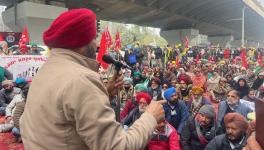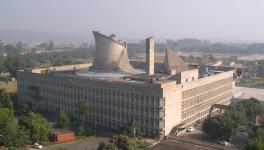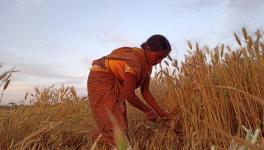Centre Withholds Funds to Punjab for Current Wheat Procurement Season, Farmers to be Most Affected
The Punjab government will not receive the Rural Development Fund (RDF) from the Union government for procurement of 132 lakh tonnes of wheat this year, as per reports. With the stopping of funds, the tussle between the Centre and the state government led Amarinder Singh of Congress in the agriculture dependent state, has once again come to the fore.
The state government has accused the Centre of “penalising” the state for raising its voice against the farm laws.
Reacting sharply to the decision, Congress MP Pratap Singh Bajwa, in a series of tweets, said: “The Government of India is penalising Punjabis for fearlessly raising their voices against farm laws by stopping payments to the rural development fund. This loss of money to State will further hamper our Punjab finances and through this, hurt the people from the State the most.”
Every year, Punjab receives 3% RDF from Food Corporation of India (FCI), the Central government’s purchasing agency, for procuring wheat and paddy from the state under Rural Development Fund Act, 1987. The funds are utilised for maintenance of rural infrastructure and, hence, directly affect the rural population that largely comprises farmers and labourers in Punjab.
Agricultural experts believe that halting RDF is, again, anti-farmer in one way. “RDF is not a new system. When there will be no rural development, the rural population will be affected. The rural population in Punjab consists mostly of farmers, including land labourers etc,” said a professor from Punjab Agricultural University.
What is RDF?
The state government, on behalf of the Central government, procures crops, including wheat and paddy to be purchased by FCI every year. In exchange, the Central government reimburses the state for the costs incurred, including transportation, labour, mandis, storage, maintenance, among others, to procure these crops. For this exchange, legislation was also passed, namely, Punjab Rural Development Act. On April 9, 1987, the Punjab Rural Development Board came into existence under the Punjab Rural Development Act that enabled the state to charge 3% of the MSP from FCI.
Also read: A State Government Grapples with Centre Denial of GST Dues
The chief minister of the state is also the chairman of the Punjab Rural Development Board. RDF is spent on “comprehensive rural development, rural electrification, construction of link roads, development of agriculture for natural calamities and development of research and education”, according to an official of the Punjab Rural Development Board.
“The Food Department claims the RDF and sends it to the Mandi board, which then utilises the funds for upkeep of rural infrastructure, electrification, etc.,” the official added.
The reimbursement of RDF is notified by the Union government every year through provisional cost sheets. However, last year, this rule was not followed. In 2020, the RDF row in the cost sheet was left blank for the Kharif harvesting season in the name of “scrutiny of the utilisation of previous funds”. This had elicited a sharp reaction from CM Captain Amarinder Singh, who had said: “There is no precedent of not releasing the RDF that is due to the state, in the name of scrutiny of the utilisation of previous funds.”
Immediately, Finance Minister Manpreet Singh Badal was asked to visit Delhi and resolve the issue with Union Minister of Consumer Affairs, Food and Public Distribution Piyush Goyal. After several meetings, only 1% fund as RDF was released by the Centre, which alleged that the state government was diverting these funds for other purposes.
“Even the 1% that was promised to us has not yet been released,” said an official from Punjab’s department of Food Supplies and Consumer Affairs.
In April, the chief minister had written to Goyal to release RDF at 3% of the MSP (minimum support price) instead of 1% for the Kharif season. It was said that the “unilateral reduction” in rate of RDF violates the federal structure as well as statutory provisions as per Section 5 of Punjab Rural Development Act, 1987.
Also read: Why Punjab Farmers are Leading Struggle Against Centre’s Farm Laws
As per the officials from Finance Department of Punjab, they have sent all records of the utilisation of the previous funds but there has been no response from the Centre.
“The records have been sent to the Centre yet the funds have not been released. We hope that the government will soon go through the records and release previous and current funds. There are talks going on,” said an official from the Finance Department.
Implications on Farmers
With the Centre withholding the RDF for the second consecutive year, the Punjab government has alleged that this is a bid to suppress the farmers’ protest against the three contentious farm laws introduced last year. As per an official, the RDF was a steady source of income with a corpus of Rs 1,500 crore every year. Its suspension will have a significant impact on the Punjab’s rural economy.
The suspension of these funds will have a direct impact on the rural infrastructure and the marketing committee, squeezing the state government’s budgets, the official added. The funds received under RDF are also used to pay interests on the Rs 4,500 crore loan obtained by the state from several banks to pay back the debt of farmers. But with no RDF, the state government will be left to take care of its financial commitments from its own dwindling coffers.
Get the latest reports & analysis with people's perspective on Protests, movements & deep analytical videos, discussions of the current affairs in your Telegram app. Subscribe to NewsClick's Telegram channel & get Real-Time updates on stories, as they get published on our website.
























